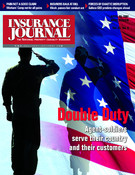As 1,200 independent agents and brokers from around the country descend on Washington, D.C., this month for the Big “I” Legislative Conference & Convention, they will be greeted with a new legislative priority: The McCarran-Ferguson antitrust repeal. While insurance regulatory reform, terrorism insurance and natural disaster issues will again be among the topics agents take to the hill, McCarran-Ferguson has emerged as the new No. 1 threat to independent agents and brokers. And what makes this issue particularly troubling is its political powerhouse backing: Senate Majority Leader Harry Reid, D-Nev., and Senate Minority Whip Trent Lott, R-Miss., are both supporting a bill to repeal the industry’s limited antitrust exemption.
Throughout Capitol Hill, the Big “I” is known for its grassroots power and clout — a fact evidenced by five sitting presidents speaking to the association in the past three decades. The Big “I” federal government affairs team has been named one of the most effective lobbying groups in Washington by Fortune magazine, Roll Call and other prestigious publications. But it’s the power of the Big “I” grassroots network that will be felt this month as agents visit with their elected representatives. Here are the messages that Big “I” agents and brokers will bring to Capitol Hill:
While the Big “I” has concerns about any modifications to the McCarran-Ferguson Act limited antitrust exemption, the long-standing practices of sharing historical loss data (but not final prices) and the joint development of standardized policy forms must be protected. The Big “I” believes that a repeal would not only negatively affect the livelihood of agents and brokers, but it also would have a disparate impact on small- and medium-sized insurance companies that rely on the exemption to compete on a level playing field with much larger insurers. A repeal could reduce competition, increase costs and reduce availability because the threat of antitrust litigation could make insurers unwilling to engage in efficiency-enhancing cooperative activities. A vibrant system of direct state supervision and law enforcement supplemented by a limited application of federal antitrust enforcement has served the industry and consumers well. IIABA sees no reason for making wholesale changes to the antitrust laws that apply to the insurance sector.
IIABA supports reform and modernization of state insurance regulation via federal legislation that makes the system more uniform and streamlined. IIABA opposes federal insurance regulation and, instead, advocates a pragmatic reform approach that utilizes targeted, federal legislative tools to improve the state-based system. IIABA strongly opposes optional federal charter legislation introduced last Congress by Sens. John Sununu, R-N.H., and Tim Johnson, D-S.D., and Rep. Ed Royce, R-Calif. IIABA supports H.R. 1065, the Nonadmitted and Reinsurance Reform Act, introduced by Reps. Dennis Moore, D-Kan., and Ginny Brown-Waite, R-Fla., in the House and S. 929, introduced in the Senate by Sens. Bill Nelson, D-Fla., and Mel Martinez,R-Fla.
Continuation and reform of the National Flood Insurance Program (NFIP) is vital to ensure the efficacy of this much needed program in the future and to protect property owners from flood losses. IIABA supports necessary increases in the NFIP’s temporary borrowing authority to ensure that consumers who purchased flood insurance obtain their rightful insurance payments. IIABA also supports modernized coverages, expansion of the mandatory purchase requirement with improved enforcement, increased mitigation/decreased subsidization, simplified processing and claims, and empowering consumers with information on flood loss histories. The Big “I” supports the Flood Insurance Reform and Modernization Act of 2007 (FIRM), introduced by House Financial Services Committee Chairman Barney Frank, D-Mass.
The Big “I” is working with interested parties to discuss all potential solutions, including federal catastrophe funds, insurer tax-free reserving and expansion of the NFIP to include windstorm coverage. IIABA supports legislation, such as HR330, the Homeowners’ Insurance Availability Act, which encourages more insurance companies to enter markets that are prone to natural disasters and to increase availability and affordability of homeowners’ insurance coverage. The Big “I” also supports the creation of a national commission to study the issue and report possible solutions (S 292 and HR537, the Commission on Catastrophic Disaster Risk and Insurance Act of 2007).
IIABA strongly opposes premium reduction plans (PRPs) because they circumvent state insurance licensing laws and are vulnerable to rebating, anti-consumer tying arrangements and unfair marketing. IIABA calls on Congress to reauthorize the PRP funding limitation amendment passed in the 2006 federal budget.
This is a critical time for independent agents and brokers on Capitol Hill — make sure your elected representatives know where you stand.
Bob Rusbuldt is CEO of the Big “I.”
Was this article valuable?
Here are more articles you may enjoy.


 Jury Finds Johnson & Johnson Liable for Cancer in Latest Talc Trial
Jury Finds Johnson & Johnson Liable for Cancer in Latest Talc Trial  Insurify Starts App With ChatGPT to Allow Consumers to Shop for Insurance
Insurify Starts App With ChatGPT to Allow Consumers to Shop for Insurance  Munich Re Unit to Cut 1,000 Positions as AI Takes Over Jobs
Munich Re Unit to Cut 1,000 Positions as AI Takes Over Jobs  Zurich Insurance Profit Beats Estimates as CEO Eyes Beazley
Zurich Insurance Profit Beats Estimates as CEO Eyes Beazley 


